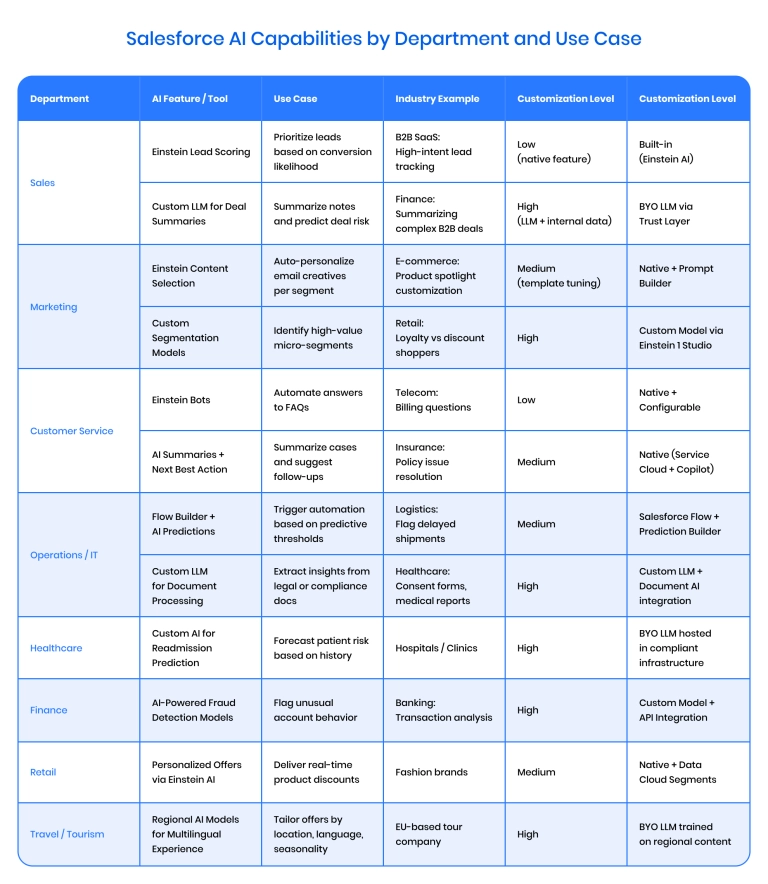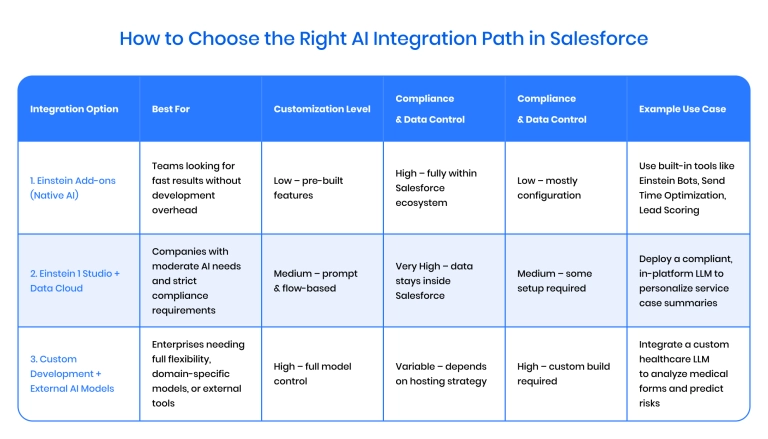As companies look for better ways to attract and keep customers, AI is becoming a key part of modern CRM systems. By combining AI with Salesforce, businesses can turn customer data into actionable insights and reach people with the right message at the right time. Salesforce understands the impact of this trend and offers significantly more customization than most other CRM systems. There is flexibility in using Salesforce native elements or creating brand-new custom elements.
In this article, we discuss the role of AI in Salesforce, including:
- Its key applications
- Statistics on its use in predictive analytics, personalized marketing, and other marketing segments.
- AI features in Salesforce Marketing Cloud
- Einstein GPT
- Salesforce's "Bring Your Own LLM" (BYO LLM) initiative
- How to integrate custom AI Models into the Salesforce Ecosystem with the help of Binariks
The role of AI in the Salesforce ecosystem
Artificial intelligence in Salesforce works through Salesforce Einstein, which analyzes CRM data—like customer interactions and deal history—to surface real-time insights and automate routine actions. That includes lead prioritization, next-best steps in support, personalized marketing, and sales forecasting—directly within the tools your team already uses.
Key applications of AI in Salesforce
How does Salesforce use AI? Here are the key applications in key areas with stats mentioned in the company's own State of Service Report:
Automation
Salesforce AI reduces manual work by automating routine sales and service processes.
- Companies using Einstein Automate report 27% faster case resolution, 29% less manual work, and 26% improved process efficiency, according to the report by Salesforce (Source ).
Personalization
Salesforce utilizes AI to tailor interactions across channels—emails, recommendations, chat—based on user behavior and preferences.
- 73% of consumers expect companies to understand their unique needs.
- Businesses using AI for personalization see a 25%+ boost in engagement and a 20%+ increase in conversions (Source ).
Analytics
Predictive and prescriptive insights help teams anticipate customer needs and optimize campaigns or sales strategies.
- 83% of business leaders say AI insights help them make faster, more accurate decisions.
- 41% of high-performing sales teams rely on predictive analytics to guide strategy.
Additional benefits of Salesforce AI
- Faster decision-making with insights
- Improved lead conversion rates
- Higher customer satisfaction scores
- More accurate sales forecasting
- Reduced operational costs overall
- Enhanced employee productivity levels
- Smarter cross-selling and upselling opportunities
- Real-time customer insights access
- Scalable personalization across channels
How AI enhances customer acquisition and retention
As AI becomes more deeply integrated into Salesforce, its most significant impact shows up in two critical areas: bringing in new customers and keeping them engaged. Here are the actual, practical ways in which Salesforce and AI enhance acquisition and retention and help companies that use them grow, with practical Salesforce AI examples:
Predictive analytics
AI in Salesforce—primarily through Einstein AI —can forecast customer behavior, such as the likelihood of conversion or churn.
- Example: A sales rep gets notified when a lead is more likely to convert based on past behavior and intent signals.
- Companies using AI for forecasting experience 15% higher win rates and 21% shorter sales cycles.
Personalized marketing
AI helps tailor content and channels for every customer.
- Example: Einstein Send Time Optimization chooses the best time to send emails to individual users based on engagement patterns.
- Marketers using AI personalization report a 25% increase in campaign performance.
Customer segmentation
AI automatically clusters customers into segments based on behavior, preferences, and lifecycle stage—far beyond basic demographics.
- Example: A retailer can identify price-sensitive customers and send tailored discount offers.
- Companies using AI-driven segmentation see up to 2.5x higher click-through rates and improved customer targeting.
AI chatbots & virtual assistants
Einstein Bots handles common customer queries and guides users through complex workflows without human intervention.
- Example: A chatbot answers order status questions instantly and transfers complex issues to human agents when needed.
- Businesses using AI chatbots report:
- 30% faster issue resolution
- 70% decrease in agent workload for routine tasks
AI-powered features in Salesforce Marketing Cloud
Let's move to the product-specific breakdown of native AI features in the Salesforce Marketing Cloud. Salesforce Marketing Cloud takes AI a step further by embedding intelligent automation into every part of the marketing workflow. The cloud integrates AI across key marketing functions—helping teams automate campaigns, optimize ad performance, and deliver personalized content at scale. Here is how:
Email campaign automation
AI optimizes email campaigns to boost engagement and reduce manual effort.
- Salesforce AI tools like Einstein Engagement Scoring and Send Time Optimization help marketers target the right people at the right moment.
- Marketers using AI report up to 20% higher open rates and 3x more conversions.
AI analytics for ad performance
AI helps identify which ads drive the best ROI and automatically adjusts campaign strategies.
- Einstein Marketing Attribution pinpoints the most effective channels and touchpoints.
- Companies using AI-driven marketing analytics reduce ad spend waste by up to 30%.
Intelligent content personalization
AI delivers relevant content based on customer behavior and preferences.
- Einstein Content Selection recommends the best creative assets for each customer in real time.
- Brands using dynamic, AI-personalized content see a 23% increase in engagement.
Einstein GPT: Generative AI for smarter CRM automation
Einstein GPT, introduced at TrailblazerDX 2023, is Salesforce's generative AI layer designed to make every internal or customer-facing interaction more intelligent, automated, and relevant. Here's how it enhances the Salesforce ecosystem :
- Natural language prompts inside Salesforce
Users can generate content like emails or case updates directly within CRM workflows using simple, conversational input—saving time and reducing manual effort.
- Context-aware content generation
Einstein GPT continuously pulls from real-time Salesforce data (via Data Cloud), ensuring outputs are always personalized and reflect the most current customer information.
- Multi-cloud application
Integrated across Sales, Service, Marketing, Commerce, Slack, and App Builder, enabling AI-driven automation at every stage of the customer journey.
- Open and flexible architecture
Combines Salesforce's own models with:
- OpenAI's ChatGPT
- Bring Your Own LLM (external or private models)
This flexibility gives enterprises control over tone, compliance, and domain specificity.
- Enterprise-grade trust and governance
The Einstein GPT Trust Layer ensures security with real-time data masking, dynamic grounding, and zero data retention—addressing key compliance concerns.
- Part of a modular AI toolkit
Seamlessly integrates with:
- Einstein Copilot for guided, AI-powered workflows
- Prompt Builder for reusable, role-specific prompt templates
- Skills Builder and Model Builder for custom actions and model integration
Is your Salesforce setup working at full capacity? Let us tailor it to your needs!
Bring Your Own LLM: Custom AI models in Salesforce
Salesforce's "Bring Your Own LLM" (BYO LLM) initiative empowers businesses to integrate their own large language models (LLMs) directly into the Salesforce platform. This approach gives organizations full control over how generative AI is used across CRM workflows—while keeping data secure and aligned with internal goals.
"Bring Your Own LLM" means companies can connect externally hosted or privately trained LLMs—like those built on open-source models (e.g., LLaMA, Falcon, Mistral) or from cloud providers (e.g., AWS Bedrock, Azure OpenAI)—to Salesforce's Einstein 1 Platform.
Instead of being locked into Salesforce's default AI, businesses can use models tailored to their domain knowledge and tone of voice.
For example, Salesforce lets you connect your own AI models using the Einstein Trust Layer, which keeps data safe through built-in safeguards.
As a company, here is what you can do with Salesforce AI solutions:
- Fine-tune on proprietary data
Use your company's own knowledge base to train or fine-tune an LLM—then deploy it inside Salesforce for customer service, sales, or marketing tasks. For example, a telecom company can train a model on its customer call logs to improve support response quality.
- Build AI-driven workflows
Integrate LLMs with tools like Flow or Sales Cloud to generate lead summaries or automated email drafts—for example, in B2B sales outreach.
- Ensure compliance & data privacy
Host your model in a compliant environment—for instance, a healthcare provider storing data on HIPAA-compliant infrastructure to ensure patient data privacy, a common example of AI in the healthcare market .
- Multilingual & region-specific capabilities
Train a model to understand the regional context—such as a travel company serving Central Europe that tailors recommendations based on local holidays, cultural references, and seasonal trends in Ukraine and Poland.
The BYO LLM approach gives companies ownership over how they adopt generative AI. It's especially powerful for:
- Enterprises with strict compliance policies
- Example: A financial institution using a privately hosted model to keep sensitive transaction data in-country and meet local data sovereignty laws.
- Organizations with proprietary datasets or IP
- Example: A pharmaceutical company using internal research data to train a model that assists with regulatory submissions and clinical trial summaries.
- Global companies needing local language support
- Example: An e-commerce brand serving diverse markets and training models to generate localized product descriptions in over 10 languages.
- Brands that want AI outputs to match their voice and values
- Example: A luxury fashion label that trains its model to write customer emails and product descriptions using its signature editorial tone.

Integrating custom AI models into the Salesforce ecosystem
As artificial intelligence becomes central to modern CRM, more companies choose to go beyond out-of-the-box tools by integrating custom AI models into the Salesforce ecosystem. These models can handle industry-specific tasks and generate insights from proprietary data.
Custom AI solutions in Salesforce give organizations the ability to:
- Automate specialized tasks, such as reviewing legal contracts
- Generate insights from internal data, such as identifying at-risk customers
- Adapt content and interactions, such as generating emails in a brand-specific tone
- Apply compliance rules, such as enforcing a data retention policy
For example, Salesforce in healthcare can support custom AI models that predict patient readmission risk based on clinical history and engagement data.
AI consulting firms are a must for a company looking to integrate Salesforce and AI.
At Binariks, we don't just implement artificial intelligence for Salesforce; we transform it into a smarter, AI-powered engine tailored to your business. From strategy to execution, we bring deep technical and industry expertise to every layer of your Salesforce ecosystem.
Our Salesforce expertise includes:
- Consulting & Implementation – Aligning your Salesforce setup with business goals and processes.
- Custom Development – Full-on AI development services : building AI-driven features that improve usability and performance.
- Integrations – Connecting Salesforce with third-party tools and custom AI models
- Migration & Support – Ensuring seamless data transitions and ongoing platform optimization
"Some companies want quick wins using native Einstein tools—that's the fastest and most cost-effective way to add AI to Salesforce without heavy development," says our Salesforce expert, who will work closely with your team throughout the project.
"Others need something more structured and secure with not a lot of custom development and still within native SF functionality, so that Salesforce Data Cloud and Einstein 1 Studio come in. This path is perfect for organizations with strict compliance requirements or those looking to integrate a custom LLM while keeping everything within Salesforce's trusted environment.
And then there are teams that need full flexibility—like using third-party AI platforms or building something from the ground up. In those cases, we offer custom development services to help you connect external models to Salesforce, with careful attention to data privacy and system compatibility. That's why we offer all three options—so no matter your goals, budget, or risk profile, we'll help you find the setup that fits."

Why us?
- AI-first approach
We specialize in integrating custom AI models—such as your own LLMs—into Salesforce using tools like Flow, Sales Cloud, and the Einstein 1 Platform.
- End-to-end support
We guide you through the entire journey from model selection (open-source, commercial) to training, deployment, and post-launch optimization.
- Data-aware architecture
We align AI outputs with your Salesforce structure and business logic, ensuring clean handoffs across systems and consistent, contextual results.
- Privacy by design
We use Salesforce’s Trust Layer, encrypted pipelines, and secure routing to keep your customer data protected and compliant.
- Enablement, not just delivery
We train your teams to work effectively with AI—building prompt libraries, adjusting workflows, and supporting real-world adoption.
- Faster time-to-value
With deep experience in both Salesforce and AI, we move quickly and deliver with precision—without sacrificing quality.
While the potential is massive, integrating custom AI models into Salesforce comes with a few hurdles:
- Data security & compliance: Especially in regulated industries, data handling needs to be airtight. We ensure that AI solutions are built with security and regulatory requirements in mind from the start.
- Data quality & preparation: AI models require high-quality, structured data to perform effectively. Many businesses struggle with inconsistent, incomplete, or unstructured data. We assist in data cleansing, normalization, and transformation to ensure AI models receive accurate and relevant inputs for optimal performance.
- System compatibility: Custom models must play well with Salesforce Flow, Apex, third-party APIs, and legacy infrastructure. We design AI models to integrate smoothly with your existing Salesforce setup and tech stack. We help ensure AI integration aligns with security standards, whether through native Salesforce tools or secure third-party solutions.
- Prompt governance: Organizations need consistent, controlled, prompt engineering strategies. We help establish clear guidelines and reusable prompts to keep outputs consistent and adequate.
- User adoption & training: AI tools are only as effective as the teams using them, so AI maintenance challenges are inevitable. We support training and adapting employees to AI-powered workflows.
Conclusion
Artificial intelligence is no longer a futuristic add-on—it's a practical driver of efficiency and personalization across the Salesforce ecosystem. From built-in Einstein features to full custom LLM integrations, Salesforce now offers businesses the tools to make every interaction smarter and every process more streamlined.
At Binariks, we help you go beyond the basics. We offer three flexible Salesforce integration paths to match your needs:
- Einstein Add-ons for fast wins with native Salesforce tools
- Einstein 1 Studio with Data Cloud for secure, in-platform LLM deployment
- Custom development to connect third-party or proprietary models to Salesforce
Ready to explore what custom AI in Salesforce can do for you? Let's talk.
Share

